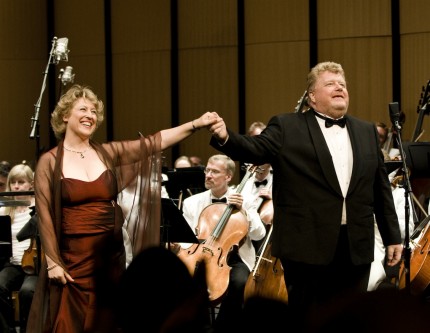Kalmar, soloists and Grant Park Orchestra shine with inspired Mahler

The benefit for Chicago audiences when the Grant Park Music Festival is chased indoors due to competing downtown events is that one gets to encounter the Grant Park Orchestra unplugged.
On Friday night Carlos Kalmar and the Grant Park Orchestra decamped to the Harris Theater for a quite extraordinary performance of Mahler’s Das Lied von der Erde. And, as acoustically sophisticated as the Pritzker Pavilion’s sound system is, it’s an entirely different experience hearing the orchestra in a more congenial indoor setting when one can appreciate what a refined and flexible ensemble it has become under Kalmar’s decade of leadership.
Mahler was ahead of his time in many ways, not least his international perspective on art and poetry. In Das Lied — his unnumbered ninth symphony — the Austrian composer set six texts of translated Chinese poetry for two soloists and orchestra. The stanzas focus on various aspects of life’s beauty and pleasures while musing on the mystery and melancholy transience of earthly life.

More so than in all the other Mahler symphonies scored for voices, any performance of Das Lied stands or falls on the quality of the two soloists. And, fortunately, this weekend’s performances boast two superb German singers, who, backed by first-class playing from the orchestra under Kalmar’s idiomatic direction, gave us the finest performance at the lakefront festival yet this summer.
Christian Elsner is a big man with an imposing voice to match. The tenor put across both the hearty and dramatic qualities of the drinking songs and showed surprising agility for such a voluminous voice in Von der Jugend.
Alexandra Petersamer has a bounteous and expressive instrument as well, able to sail over the orchestra in full volume and cope with some of Kalmar’s blazingly fast tempos.
The German mezzo-soprano rose to the supreme challenge of Der Abschied in fine style, her singing of this expansive farewell to earthly life suffused with a world-weary regret and stoic solace. Petersamer didn’t quite reach the depths of the greatest interpreters of this music on Friday, but it was an affecting performance nonetheless.
Most impressive of all was the concentrated, acutely idiomatic conducting of Kalmar and the responsive playing of the Grant Park musicians. As with his Mahler Ninth two summers ago, Kalmar once again showed himself as one of our finest Mahler conductors, in a city that has heard some of the greatest of the past century. Rarely will one hear such a fluent melding of orchestra and voices as here with the exchanges between the singers and instrumental soloists finessed with such idiomatic style and grace.
Indeed, the playing of the Grant Park Orchestra had a vibrance, unjaded freshness and discovery about it –undoubtedly in part because the superb Lyric Opera musicians that make up a good part of the ensemble never get a chance to perform this repertoire. Woodwinds were especially inspired, led by the evocative flute playing of Mary Stolper.
Let’s hope that for Saturday’s repeat the audience allows a minute for the hushed coda of Der Abschied to hang in the air before breaking in with applause.
The evening led off with Lutoslawski’s Musique Funebre. The Polish composer’s dark threnody for string orchestra nicely set the introspective mood.
Cast in an arch-like structure, the work opens with a lugubrious solo cello that leads into a mysterious pizzicato passage, segueing into an urgent chromatic section and dissonant chords before the tempo decelerates and returns to the spare broken notes of the solo cello.
Kalmar led a rich, detailed performance drawing dark, lustrous string playing. In the Harris one could hear and appreciate the finely terraced dynamic marking in the quiet sections, as well as the expressive, nuanced playing of principal cello Walter Haman.
The program will be repeated 7:30 p.m. Saturday at the Harris Theater. Admission is free. grantparkmusicfestival.com
Posted in Performances




